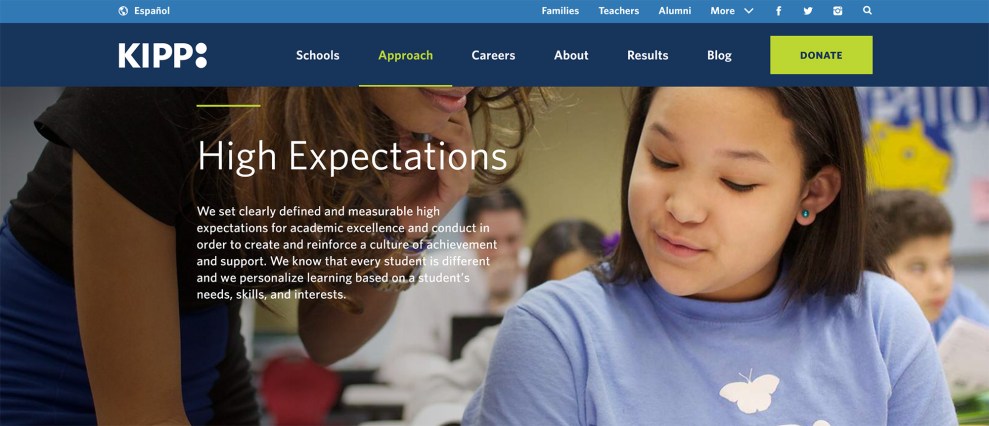
KIPP has done some great work in its charter schools. The question is, can they continue to do great work if they expand by 100x?Knowledge Is Power Program
NOTE: I wrote this last week and then forgot all about it. I guess something else must have grabbed my attention.
Over at New York, Jonathan Chait has a longish piece about charter schools. His main point is that there’s been something of a revolution in the charter school space that progressives have ignored because of their fealty to teachers unions. I don’t feel like getting into the union stuff right now, but the broad area of charter schools is one that I’ve followed off and on pretty regularly for the past ten years at least, so I was interested in Chait’s primary thesis:
What the charter movement has developed is highly effective networks of public charters — such as Success Academy, the Knowledge Is Power Program, and Uncommon Schools — that specialize in closing the achievement gap between Black and white students….Many of those gains are huge, effectively wiping out the educational inequities that have persisted for the entire history of American schools.
In part because of charters’ messy evolution, the mounting proof that the schools work has been met with a nagging roster of objections. Some skeptics have raised the suspicion that these schools are merely “teaching to the test,” incentivizing teachers to robotically drill their pupils in narrow subject matter….Another possible objection is that charters can only help students whose parents have the motivation to seek them out. This turns out not to be true either….Doubters have fallen back on the claim that, even if charters help the students who enroll in them, the children left behind are harmed….But the research, so far, doesn’t support a zero-sum view.
After reading this I did some checking to see if I had missed anything big over the past couple of years. It doesn’t really seem like it. The basic shape of things with charter schools is that, on average, they perform about as well as regular schools, but the best charters do indeed perform quite a bit better. The very best, as Chait says, even produce gains for their Black kids that nearly wipe out the Black-white educational gap that’s been a feature of American education forever.
This is good news in a way, but I have a couple of objections that Chait doesn’t take on. Both of them are related to scalability:
- In all human endeavors, the top 10 percent, by definition, perform better than the other 90 percent. That’s true of teachers, accountants, truck drivers, bloggers, and everyone else. Practically all of recent human history has been defined by efforts to figure out what those top 10 percent do and how to transfer their performance to everyone else. It generally hasn’t worked very well. The top 10 percent, it turns out, are generally just smarter, more enthusiastic, and harder working than everyone else, and there’s no way to make everyone in the country as good as them.
- The charter networks that Chait mentions are still quite small, serving barely more than 100,000 students in total. What’s more, they rely mostly on young teachers who are required to put in very long hours for fairly moderate pay. There’s simply a limited number of teachers willing to put up with this for more than a few years.
It’s easy to say that we need to focus not on charter schools in general, but only on the charter programs that work. However it’s far from clear that these top performers can scale up nationwide even under the best of circumstances. This is one reason that a program like KIPP, for example, has expanded so slowly. After 25 years they now serve about 90,000 students, an agonizingly slow growth rate.
Scalability is the Achilles’ heel of practically every good idea, which is why the ones that do scale get so much admiration. So far, it’s also been the Achilles’ heel of the charter movement, and unfortunately there’s no good reason to think that anyone has any idea how to address it.

















